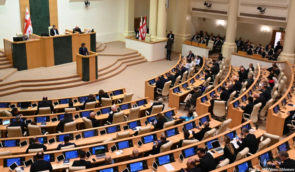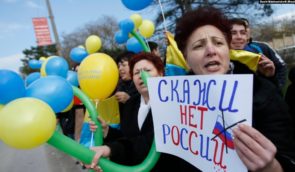MPs to try to improve law on decommunization
The bill No. 3699, which should bring the decommunization law into line with the European standards and best European practices, was registered in the Ukrainian Parliament after the Venice Commission had condemned certain provisions of the law on decommunization.
This is reported by MediaSapiens.

“April 9, 2015, the Verkhovna Rada of Ukraine passed the law on the condemnation of the Communist and National Socialist (Nazi) totalitarian regimes in Ukraine and prohibition of promotion of their symbols with 254 votes. The bill was submitted on April 6 and was passed as a basis and as a whole under a shortened procedure without the opportunity to file the amendments to the draft, without conducting a proper broad public debate. Unfortunately, the poor preparation led to the fact that the new law was very far from the best practices in this area as evidenced by the appropriate conclusion of the Venice Commission. A proposed mechanism of the ban on propaganda of the Communist and / or the National Socialist (Nazi) totalitarian regimes and the use of symbols may cause significant risks of massive violations of the rights of citizens and therefore requires significant improvement. In particular, this refers to the changes introduced to the special legislation,” reads the explanatory note to the bill.
The document amends Part 2 of Article 9 of the Law “On Television and Radio Broadcasting”. According to the provision, the broadcaster will not have the right “to broadcast the audiovisual works praising the Communist totalitarian regime of 1917-1991 in Ukraine, the Nazi totalitarian regime, the activities of senior officials of the Communist Party, government and administration of the USSR, the Ukrainian SSR, and other Soviet republics (except the cases related to the development of Ukrainian science and culture), the employees of the Soviet state security bodies, the activities of the Soviet state security bodies, the establishment of Soviet power in Ukraine or individual jurisdictions, harassment of participants in the struggle for Ukrainian independence in the 20th century.”
The document also proposes to narrow the list of symbols of the Communist and National Socialist (Nazi) totalitarian regimes, give the accurate definition of propaganda and use of symbols of the Communist and Nazi totalitarian regimes, allow the use of banned symbols in art, science and other “non-political” purposes, prohibit the use of Communist and Nazi symbols in order to promote communism and Nazism.
The bill also prohibits the use of the Communist and Nazi symbols by the authorities and economic entities, eliminates the penalty of imprisonment, substituting it with milder sanctions.
May 15, 2015, President of Ukraine Petro Poroshenko signed four laws on decommunization prohibiting the Soviet Union symbols, condemning the Communist regime, opening the archives of the Soviet secret services and recognizing the Ukrainian Insurgent Army and other organizations as the fighters for independence of Ukraine.
Earlier, human rights defender Volodymyr Yavorsky suggested improving the law on prohibition of the totalitarian symbols.
Human rights activist Borys Zakharov noted that it was necessary to rename the streets and demolish the monuments to the Communist idols as the symbols shaped the consciousness. However, the monuments and plaques may be stored in the museums of totalitarianism in the parks on the outskirts of the cities.








